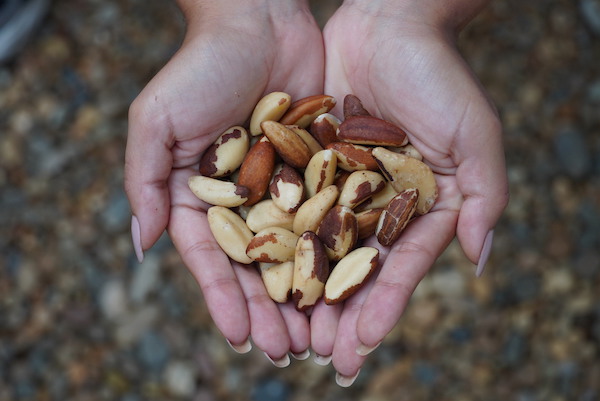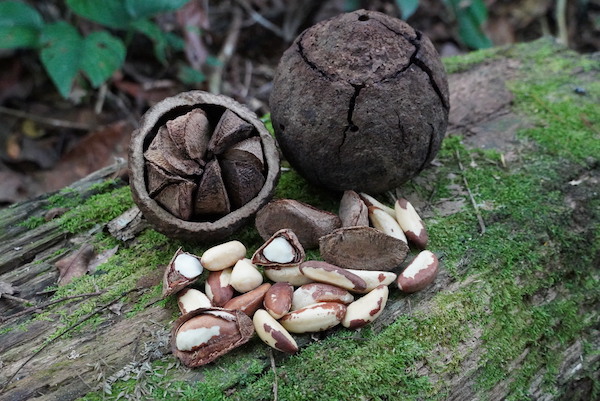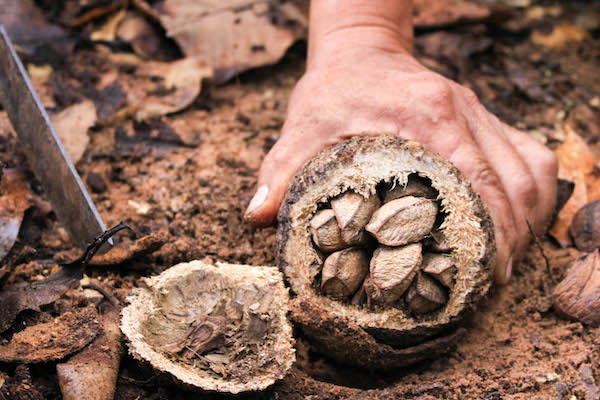This year’s Brazil nut volumes are down and it’s causing a boost in the market’s prices. Byron Machuca of Peruvian company White Lion Foods explains: “The prices have been low for the past two years, ever since they reached record levels in 2017, but so far in 2021 we have seen the prices increase again and I believe that they will only continue to rise over the coming weeks and months.”
Brazil nuts are harvested in the Amazon rainforest and companies in multiple Latin American countries with access to the forest process and distribute them.

Historically low pricing hurt the industry in recent years
In 2017, the Brazil nut volumes were down about 40%, and this caused prices to reach levels of around $25 per kilo by the end of that year, Byron shares. “Then, starting in 2018, when the new harvest came around, the prices gradually decreased and in the past two years the average price was around $6 per kilo. That’s a historically low price because even though in the years prior to the 2017 season, the average pricing was also around $6 per kilo, if you take into account the inflation and currency devaluation, a price of $6 per kilo today has a lower value than it did 6-7 years ago,” he says.
The low prices have taken a toll on the industry in the past two years, says Byron. “Brazil nuts aren’t actually farmed; they grow wild in the Amazon rainforest and the people who live in the forest gather the nuts and then sell them to the processors/exporters like White Lion Foods. When the prices were so low, these people stopped collecting the nuts because the price they received for them just wasn’t worth the effort. This has a negative effect on the environment too, because often these people will switch to cutting down trees and selling the wood when they can’t sell Brazil nuts,” he explains.

Pricing looks to be improving this year
This year, it looks like the overall volumes of Brazil nuts are down about 20-25%, though this is just an estimate because of the wild nature of these nuts. “In December of 2020, the international price of the Brazil nuts was at $5 per kilo, but as of the end of March, we’ve gotten up to $9 per kilo and I believe we’ll reach $10 per kilo easily this year,” says Byron.
Currently, almost all Brazil nuts of this season’s growth have been harvested, but sales will continue throughout the year. Machuca says: “When they are dried and stored properly, you can spread out your sales and have product availability throughout the year. Especially when the total volumes are low, we try to spread out our sales and sell our stocks gradually so that there isn’t a gap in supplies before the start of the new season.”

Superfood status needs more visibility
One of the biggest problems with the Brazil nut industry, according to Byron, is that the nuts aren’t marketed as a superfood enough. “These nuts are often perceived to be in the same category as many commercially produced nuts, when they are actually nothing like these other nuts. Brazil nuts can’t be farmed, and the supplies are always very limited. Additionally, their nutritional value is really amazing and much greater than other nuts. These things should be reflected in the pricing of these nuts, but unfortunately, because buyers aren’t aware of these things, they aren’t willing to pay the higher prices that Brazil nuts ask for,” he says.
Fortunately, work is being done on promoting the superfood status of Brazil nuts. “PROMPERU has been working on promotion of the Brazil nuts, and South Korea is a great example of their success. In 2015, South Korea imported almost no Brazil nuts at all, but in 2020 they bought roughly 100 containers. Brazil nuts are the best kept secret among superfoods, and we are trying to spill the secret and replicate what happened in South Korea in other markets. It’s a challenge that people aren’t aware of the amazing qualities of Brazil nuts, but that also means that there is a huge opportunity for growth,” Byron concludes.
 For more information:
For more information:
Byron Machuca
White Lion Foods
Tel: +51 987 393 772
Email: byron@whitelionfoods.com
ww.whitelionfoods.com
